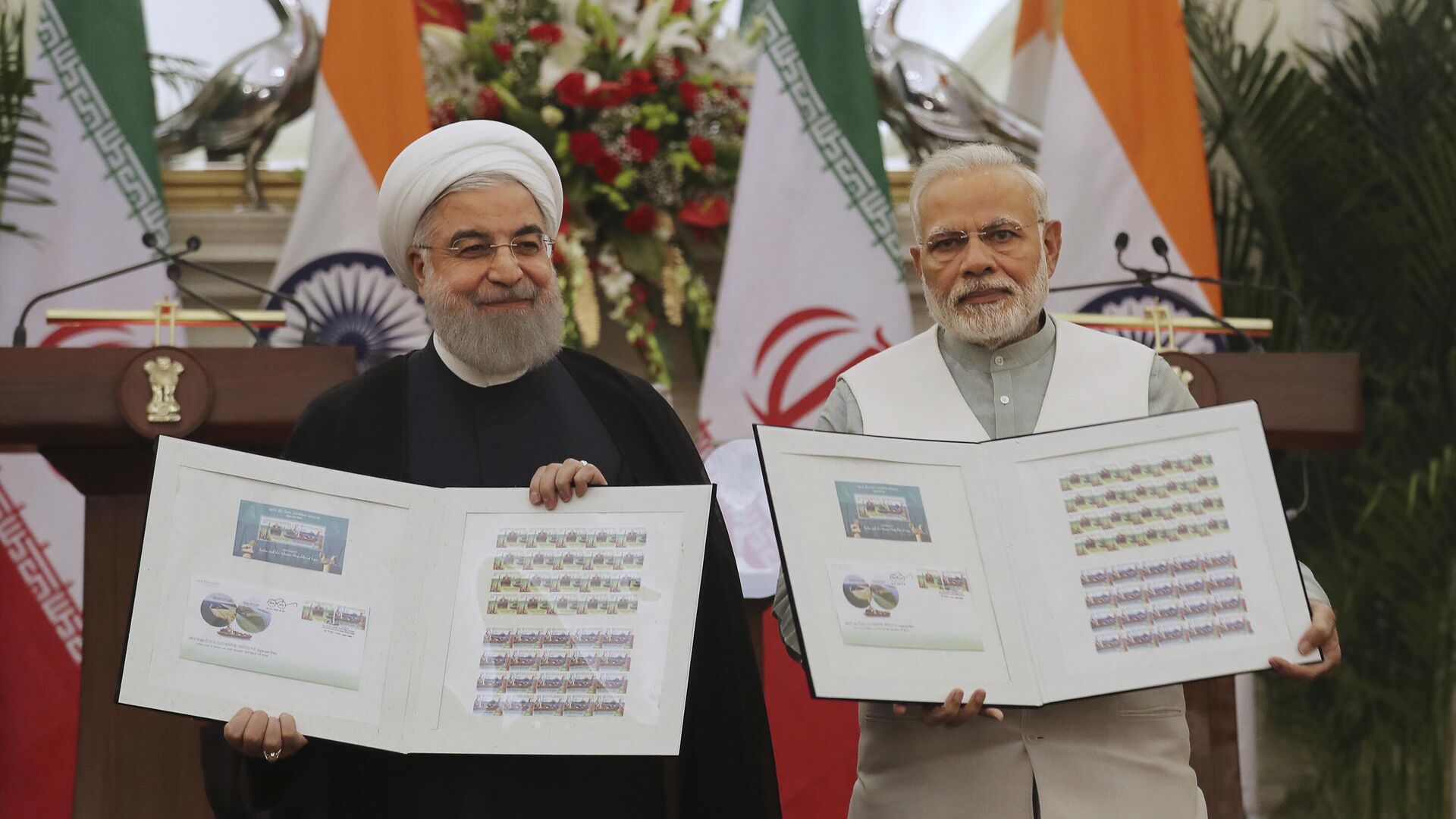https://sputnikglobe.com/20240515/us-is-hurting-itself-washington-threatens-sanctions-against-india-in-response-to-iran-deal-1118437440.html
US is 'Hurting Itself': Washington Threatens Sanctions Against India in Response to Iran Deal
US is 'Hurting Itself': Washington Threatens Sanctions Against India in Response to Iran Deal
Sputnik International
During a US State Department briefing on Monday, US spokesperson Vedant Patel threatened India with sanctions should they choose to do business with Tehran.
2024-05-15T06:41+0000
2024-05-15T06:41+0000
2024-05-15T06:41+0000
analysis
india
us
americans
washington
tehran
brics
sanction
us sanctions
us hegemony
https://cdn1.img.sputnikglobe.com/img/07e8/05/0f/1118440877_0:196:2928:1843_1920x0_80_0_0_20f2fb1bbc67b3cdeeff33f83d85eb93.jpg
During a US State Department briefing on Monday, US spokesperson Vedant Patel threatened India with sanctions should they choose to do business with Tehran. The announcement came hours after Iran and India signed a 10-year contact to develop and operate the Chabahar port. "We are aware of these reports that Iran and India have signed a deal concerning the Chabahar Port," said Patel. "Any entity, anyone considering business deals with Iran, they need to be aware of the potential risk they are opening themselves up to, potential risk of sanctions.”On Tuesday, Dr. Mohammad Marandi, a professor of English literature and Orientalism at the University of Tehran, joined Sputnik’s The Critical Hour to discuss the “potential risks” of sanctions imposed by the US.“I think it's quite clear that the US has long ago passed the point where countries will tolerate its imposition of sanctions on different countries and entities. The US is trying to dictate terms to China, to Russia, to India, to Brazil, to Iran, to South Africa,” said Marandi. “And, the more it does this - the more animosity it creates and the greater the incentive there is to create financial institutions and means of traded business that are not controlled by the US.”“By effectively attacking India in this manner [the US] is creating a wider gap between itself and that country at a time when we are approaching the next Shanghai Cooperation Organization summit and also the next BRICS summit. And, Russia, in particular, and China and Iran also, are very keen on using the coming months to coordinate with one another to create those institutions.”Sputnik’s Garland Nixon suggested that the Americans who benefit from foreign policy decisions such as these are the “tiny group of billionaires”. Adding that, however, such policies do not benefit the working majority.“I think many people recognize it when we speak about the US, we're talking about these elites,” said Marandi. “There's a sharp divide between what the Americans and what the regime in Washington wants. And you're absolutely correct - those who are benefiting. And they're not benefiting anymore from these sanctions, through these sanctions, by the way, that era is gone.”India’s shipping ministry announced the penned $370 million deal between the Indian Ports Global Limited (IPGL) and the Port & Maritime Organization (PMO) of Iran on Monday. India first entered an agreement to develop the port in 2016, but the process was stalled for two years by US sanctions that were reimposed after Washington's unilateral withdrawal from the 2015 nuclear deal with Iran.In 2018, India agreed to take over operations of the port, allowing an open transit route for Indian goods to reach Afghanistan and Central Asia while avoiding the land route of Pakistan. Thus far, a total of 2.5 million tonnes of wheat and 2,000 tonnes of pulses have been successfully transported from India to Afghanistan through the port.“And I think they're also having problems at home. So, they have a lot - the regimes - have a lot on their plates. And I think that it's going to be very difficult for them to keep these young Americans and Europeans in check,” said Marandi. “I'm optimistic about the future, but I also recognize that the months and years ahead are going to be very challenging.”The sanctions imposed by Washington on Tehran will stay in effect and be upheld with no exemption for New Delhi, the US spokesperson said. India has not responded to the US threats, but Tehran has said that Washington is “addicted” to imposing sanctions.
washington
tehran
Sputnik International
feedback@sputniknews.com
+74956456601
MIA „Rosiya Segodnya“
2024
Mary Manley
https://cdn1.img.sputnikglobe.com/img/07e6/01/0b/1092187887_0:0:2048:2049_100x100_80_0_0_0c2cc4c84f89aff034cc55bb01fb6697.jpg
Mary Manley
https://cdn1.img.sputnikglobe.com/img/07e6/01/0b/1092187887_0:0:2048:2049_100x100_80_0_0_0c2cc4c84f89aff034cc55bb01fb6697.jpg
News
en_EN
Sputnik International
feedback@sputniknews.com
+74956456601
MIA „Rosiya Segodnya“
Sputnik International
feedback@sputniknews.com
+74956456601
MIA „Rosiya Segodnya“
Mary Manley
https://cdn1.img.sputnikglobe.com/img/07e6/01/0b/1092187887_0:0:2048:2049_100x100_80_0_0_0c2cc4c84f89aff034cc55bb01fb6697.jpg
tehran, india, us, sanctions, iran-india relations, iran-india trade, iran-india talks, india-iran trade, india-iran relations, india-iran talks, us sanctions, us hegemony, us dominance, us domination
tehran, india, us, sanctions, iran-india relations, iran-india trade, iran-india talks, india-iran trade, india-iran relations, india-iran talks, us sanctions, us hegemony, us dominance, us domination
US is 'Hurting Itself': Washington Threatens Sanctions Against India in Response to Iran Deal
Over the past three years, the US has slapped Iran with more than 600 similar sanctions.
During a US State Department briefing on Monday, US spokesperson Vedant Patel threatened India with sanctions should they choose to do business with Tehran. The announcement came hours after Iran and India signed a 10-year contact to develop and operate the Chabahar port.
"We are aware of these reports that Iran and India have signed a deal concerning the Chabahar Port," said Patel. "Any entity, anyone considering business deals with Iran, they need to be aware of the potential risk they are opening themselves up to, potential risk of sanctions.”
On Tuesday, Dr. Mohammad Marandi, a professor of English literature and Orientalism at the University of Tehran, joined Sputnik’s The Critical Hour to discuss the “potential risks” of sanctions imposed by the US. “I think it's quite clear that the US has long ago passed the point where countries will tolerate its imposition of sanctions on different countries and entities. The US is trying to dictate terms to China, to Russia, to India, to Brazil, to Iran, to South Africa,” said Marandi. “And, the more it does this - the more animosity it creates and the greater the incentive there is to create financial institutions and means of traded business that are not controlled by the US.”
“In the long term, the US is hurting itself more than anyone else, because once the US dollar becomes less important, that means that there will be an excess of dollars and that inflation of US dollars that we see in the US - the constant printing of money - is going to be increasingly felt at home in the US,” he added.
“By effectively attacking India in this manner [the US] is creating a wider gap between itself and that country at a time when we are approaching the next Shanghai Cooperation Organization summit and also the next BRICS summit. And, Russia, in particular, and China and Iran also, are very keen on using the coming months to coordinate with one another to create those institutions.”
Sputnik’s Garland Nixon suggested that the Americans who benefit from foreign policy decisions such as these are the “tiny group of billionaires”. Adding that, however, such policies do not benefit the working majority.
“I think many people recognize it when we speak about the US, we're talking about these elites,” said Marandi. “There's a sharp divide between what the Americans and what the regime in Washington wants. And you're absolutely correct - those who are benefiting. And they're not benefiting anymore from these sanctions, through these sanctions, by the way, that era is gone.”
“The US is a brutal and barbaric regime that will not give up. It will not let go. It wants to bring down the government, and by doing so it's willing to make people suffer as much as they possibly can," he added. "This is the nature of the US, this is the nature of the regime in Washington. And ordinary Americans are increasingly seeing through this, some because of the decline of the US, obviously. They see that the livelihood that their parents had no longer exists in the world today. But I think many young Americans, they are, they're highly principled.”
India’s shipping ministry announced the penned $370 million deal between the Indian Ports Global Limited (IPGL) and the Port & Maritime Organization (PMO) of Iran on
Monday. India first entered an agreement to develop the port in 2016, but the process was stalled for two years by US sanctions that were reimposed after Washington's unilateral withdrawal from the 2015 nuclear deal with Iran.
In 2018, India agreed to take over operations of the port, allowing an open transit route for Indian goods to reach Afghanistan and Central Asia while avoiding the land route of Pakistan. Thus far, a total of 2.5 million tonnes of wheat and 2,000 tonnes of pulses have been successfully transported from India to Afghanistan through the port.
“I think that the US and Europe are moving towards greater despotism and greater control over their populations. But, I think that, simultaneously, there's a huge awakening across the world and especially in the US and Europe, and they do not have the power to control events beyond Europe and the US,” the professor added.
“And I think they're also having problems at home. So, they have a lot - the regimes - have a lot on their plates. And I think that it's going to be very difficult for them to keep these young Americans and Europeans in check,” said Marandi. “I'm optimistic about the future, but I also recognize that the months and years ahead are going to be very challenging.”
The sanctions imposed by Washington on Tehran will stay in effect and be upheld with no exemption for New Delhi, the US spokesperson said. India has not responded to the US threats, but Tehran has said that Washington is “addicted” to imposing sanctions. 




